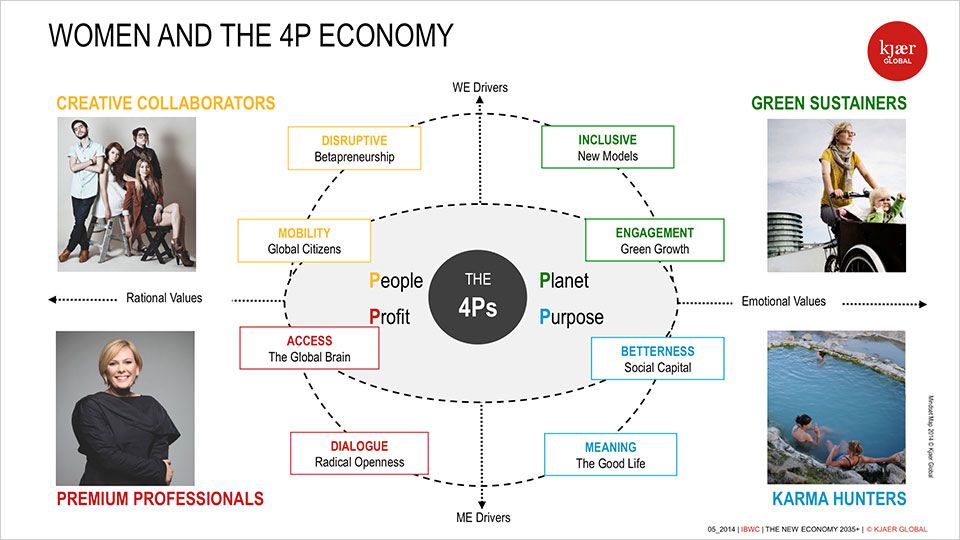Organisations face increasing global complexity and fresh thinking is needed. But for this to flourish and solve the economic challenges ahead, we must have more gender-balanced business leadership.
Understanding Risk and Opportunities
New performance parameters are already shaping tomorrow’s more female focused economy and organisations are rethinking the fundamental: What, How and Why of their business ecosystem. For far too long, society has banked on factual and left-brain values only; but creating a 21st-century inclusive economy means balancing these with right-brain more visionary values. As, mathematician Henri Poincaré noted: ‘It is by logic that we prove, but by intuition that we discover’.
The 4Ps that Matters
We need to redraw the map of success using a 4P approach that balances People, Planet, Purpose and Profit; once we have a positive impact on people and planet – with a purposeful ethos to match – we enrich our environment and improve business performance. Kjaer Global’s trend management system is a Multidimensional Thinking methodology that enables companies to navigate risk and tap into new opportunities; it considers the rational scientific and social dimensions of society, along with emotional and value driven spheres. Our Trend Atlas indicates a strong call for Purpose-driven leadership underpinned by the 4Ps. Eight key trends shape the New Economy 2035+ and they are all interconnected.
Building an Inclusive Economy
Radical Openness is essential to reputation management and, according to Edelman Trust Barometer 2014, over 80% of people think CEOs have a duty to communicate clearly and transparently. The Global Brain (Internet of Things) drives the digital transformation, as it is an enabler of positive change; e-governance, as demonstrated by Scandinavia’s approach, will benefit the economy by enabling openness and access to information for everyone. Already big data and meaningful analytics are working to improve quality of life and solve complex society challenges, but we need more women in the technology sector. According to WEF (World Economic Forum), the European female digital skills gap is a missed economic opportunity as less than one in five of ICT bosses are women.
The Female Business Factor
Global Citizens are hyper mobile and growing talent pool currently transforming the 21st-century workplace. By 2020, Millennials will form half the workforce and undertake most international assignments; they expect to work for purpose-driven leaders with a ‘A Better World’ agenda. Gender equality will be crucial – with the Scandinavian economic model demonstrating that it also makes good business sense. Betapreneurship is driven by disruptive innovation and here the female factor will radically alter the business landscape. By 2020, two thirds of graduates in advanced economies will be women – yet currently, less than a third of Europe’s entrepreneurs are female. Aware of the need for innovation for economic growth, the EU now promotes entrepreneurship as a career choice.
Sharing is Caring
New Models for business are centred around a sharing culture – as attitudes shift towards access over ownership. Implicit in these models is a vision of the circular economy, in which we design systems and products that maximise lifecycle and minimise waste. Green Growth is a major opportunity, with empathic leadership supporting new clean technologies. The Danish island of Samsø provides a living example of what can be achieved when the whole community works together and has a stake in the success of a green enterprise. This is also the perfect business case for Social Capital, which is not just the sum of the institutions that underpin society, but the glue that holds them together. New communities and shared value will be hallmarks of growth in the 21st-century, enabling mobility, social progress and a philosophy of business based around ‘betterness’.
The Capital P in Leadership is Purpose
The Good Life is the overriding trend to watch 2035+ and it is also the key driver into which all other trends feed, as people start to question conventional ways of measuring success. Mindfulness and deep storytelling are themes being pioneered by institutions such as The School of Life, while Harvard’s course on ‘happinomics’ is oversubscribed and already informing the next generation of business leaders. The eight key trends explored are all underpinned by Purpose and provide clear signs that the 4P Economy is already becoming a reality. 4P works because it engages with local communities, cultivates betterness and promotes universal access to education and opportunities in order to drive innovation and growth.
A New Map of Success
As we redefine what success looks like, we must also consider the values shaping tomorrow’s women in business. Rational and me-oriented: Premium Professionals are high achievers who value dialogue and access, while Creative Class are we-oriented collaborators who seek out disruptive innovation and mobility. Emotional and we-oriented: Green Sustainers champion global opportunities for inclusivity and engagement, while me-oriented Karma Hunters are mindful idealists who work for betterness and meaning.
There is growing evidence that business and society can thrive on alternative models by exploring options beyond the current unsustainable trajectory. Successful organisations of the future will be agile enough to adopt the 4Ps in order to deliver sustainable, social, emotional and economic value – women are set to be key to this economic solution, as they take on leadership roles in ever-greater numbers.
Related
Future of Work & Workplaces 2030+
What will the workplaces of tomorrow be like? When, where and how will we work?






